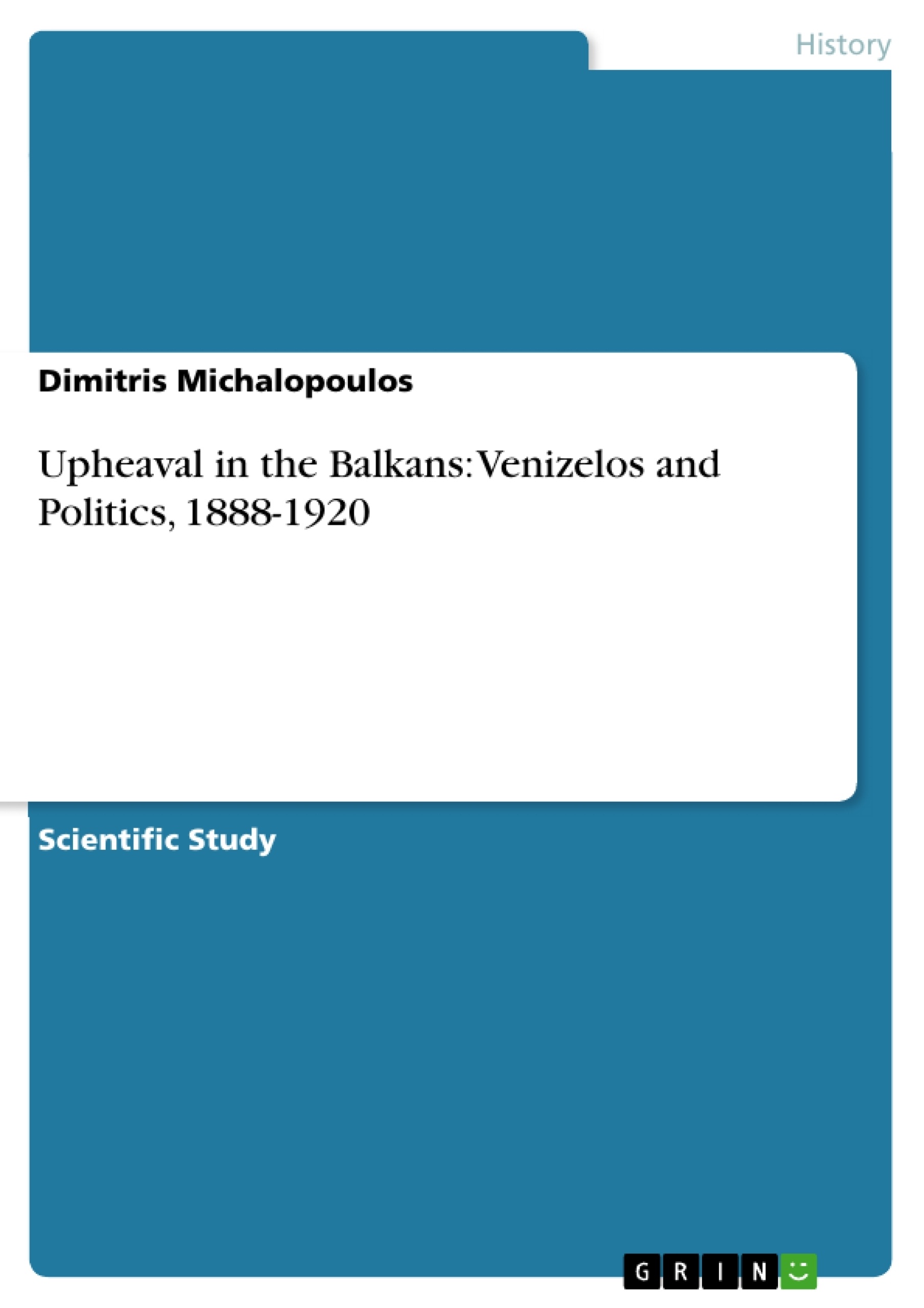Eleutherios Venizelos (1864-1936) is an emblematic figure in the History of Modern Greece, for he is regarded as the champion of parliamentary democracy and of Greek irredentism - in short, a great statesman. Even the 1922 Greek Catastrophe in Asia Minor is ascribed to his political foes, who, were accordingly executed in November 1922. That is why it is a difficult and dangerous task to sort out the truth from the relevant myth.
No amazement is to be expressed by that. In fact, whenever politics and History are intermixed, History suffers at the hands of politics and not politics at the hands of History. Consequently, discovering the truth implies reconsideration of History and perhaps coping with the Future on a basis quite different from the one hitherto. Still, voluntarily or not, this is the very mission of this book.
Inhaltsverzeichnis (Table of Contents)
- CHAPTER ONE The Cretan Prelude
- CHAPTER TWO The Maturation of the Wars
- CHAPTER THREE The Balkan Wars
- CHAPTER FOUR The National Divide of the Greeks
Zielsetzung und Themenschwerpunkte (Objectives and Key Themes)
This book examines the political landscape of the Balkans during the late 19th and early 20th centuries, focusing on the pivotal role of Eleutherios Venizelos in shaping the region's destiny. It aims to shed light on the complex interplay of political forces, national aspirations, and international alliances that shaped the tumultuous years leading up to and during the Balkan Wars.- The rise and influence of Eleutherios Venizelos in Greek politics.
- The political and social tensions in the Balkans leading up to the Balkan Wars.
- The complex dynamics of international alliances and rivalries in the region.
- The impact of the Balkan Wars on the political and territorial landscape of the Balkans.
- The emergence of national consciousness and identity in the region.
Zusammenfassung der Kapitel (Chapter Summaries)
- Chapter One: The Cretan Prelude This chapter provides an overview of the Cretan Question, a long-standing dispute between Greece and the Ottoman Empire over the island of Crete. It explores Venizelos's early career in Cretan politics and his role in the island's struggle for autonomy.
- Chapter Two: The Maturation of the Wars This chapter examines the political developments in the Balkans leading up to the Balkan Wars. It focuses on Venizelos's diplomatic efforts to forge alliances and secure international support for Greece's national aspirations.
- Chapter Three: The Balkan Wars This chapter provides a detailed account of the Balkan Wars, highlighting the military campaigns, political maneuvering, and strategic alliances that shaped the course of the conflicts.
- Chapter Four: The National Divide of the Greeks This chapter delves into the political divisions within Greece during the Balkan Wars. It explores the conflict between Venizelos's nationalist agenda and the opposition's resistance to his policies.
Schlüsselwörter (Keywords)
This work explores the tumultuous history of the Balkans in the early 20th century, with a particular focus on the role of Eleutherios Venizelos in shaping the political landscape of the region. Key concepts include Greek nationalism, international alliances, the Balkan Wars, political divisions, and the emergence of national identities.Frequently Asked Questions
Who was Eleutherios Venizelos?
Venizelos was a prominent Greek statesman regarded as a champion of parliamentary democracy and Greek irredentism during the late 19th and early 20th centuries.
What was the "Cretan Question"?
It was a long-standing dispute between Greece and the Ottoman Empire over the island of Crete, where Venizelos began his political career.
What is the focus of the book "Upheaval in the Balkans"?
The book examines the political landscape of the Balkans and the role of Venizelos in shaping the region during the Balkan Wars.
How did the Balkan Wars impact Greece?
The wars significantly altered the political and territorial landscape, but also led to deep internal political divisions known as the National Divide.
What internal conflict did Greece face during this period?
There was a major conflict between Venizelos's nationalist agenda and the opposition, which eventually culminated in the 1922 Greek Catastrophe.
- Arbeit zitieren
- Dimitris Michalopoulos (Autor:in), 2014, Upheaval in the Balkans: Venizelos and Politics, 1888-1920, München, GRIN Verlag, https://www.grin.com/document/281456



